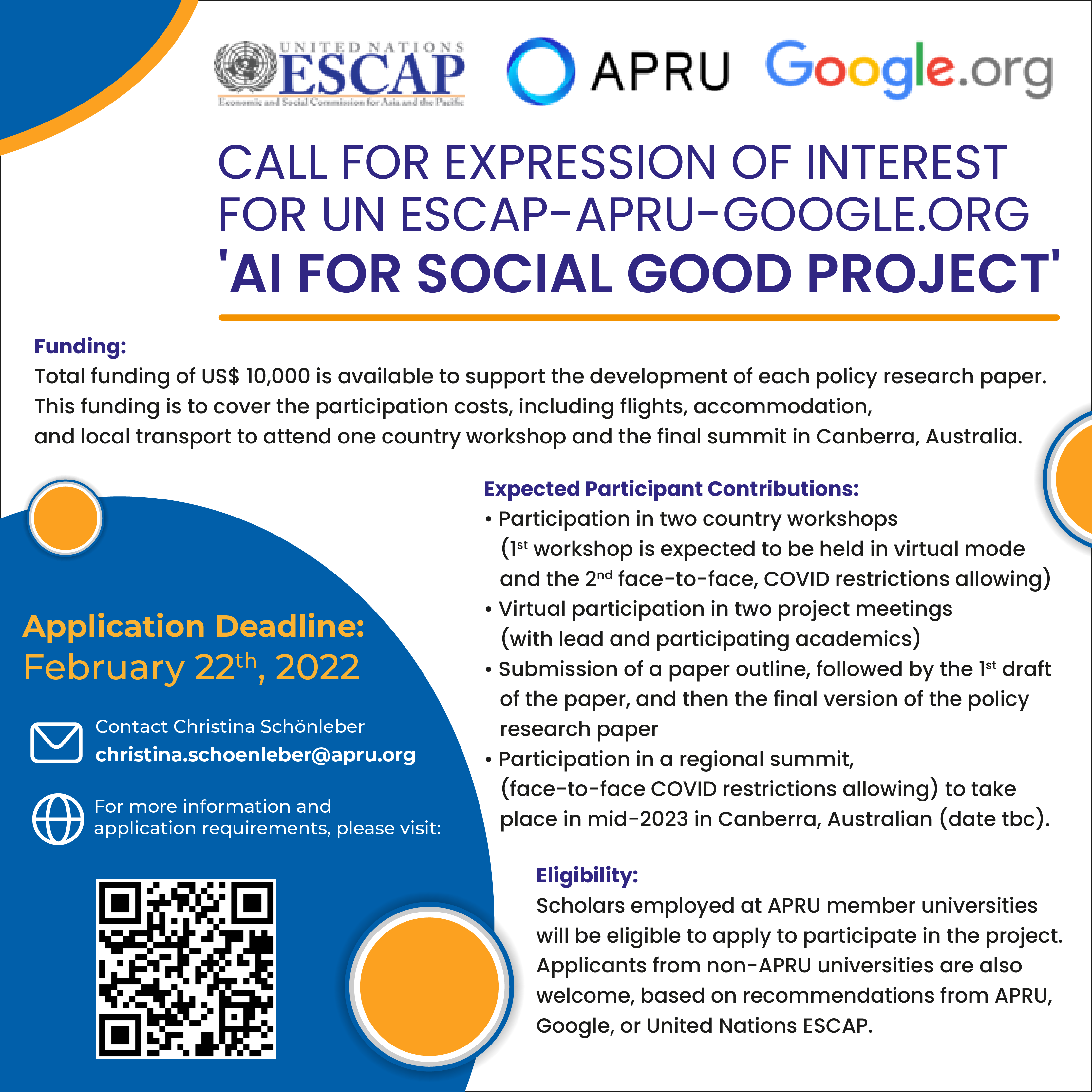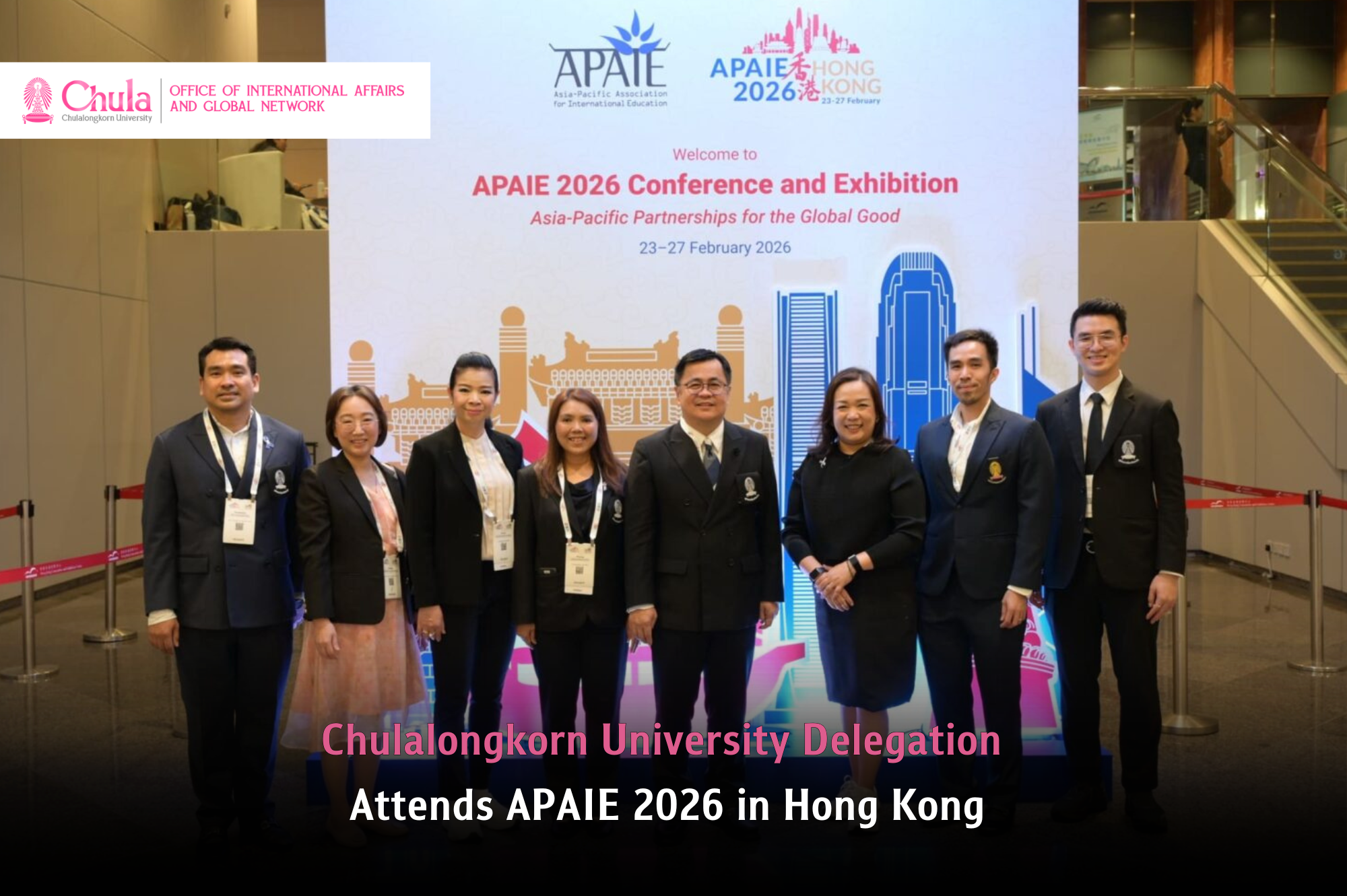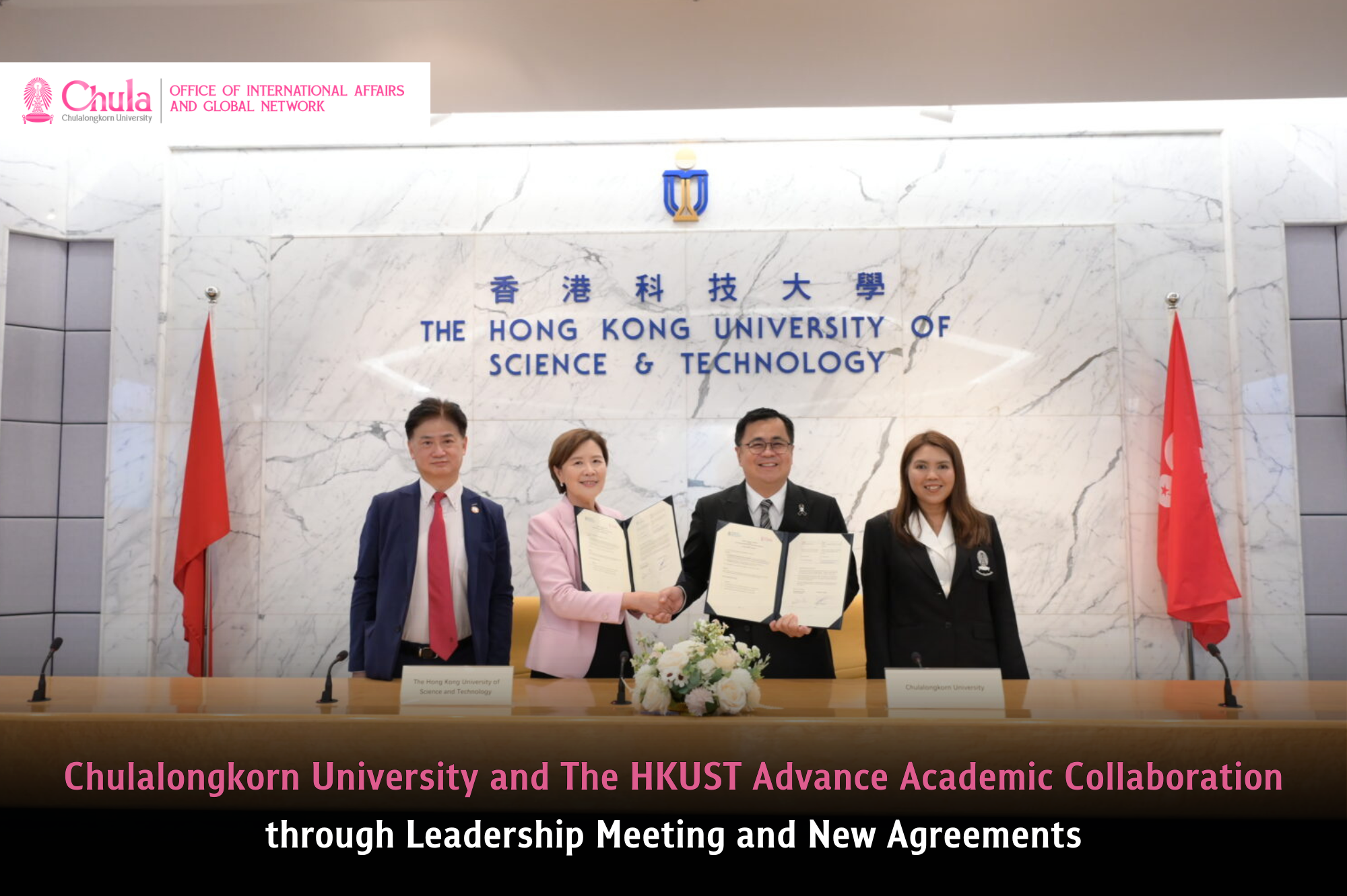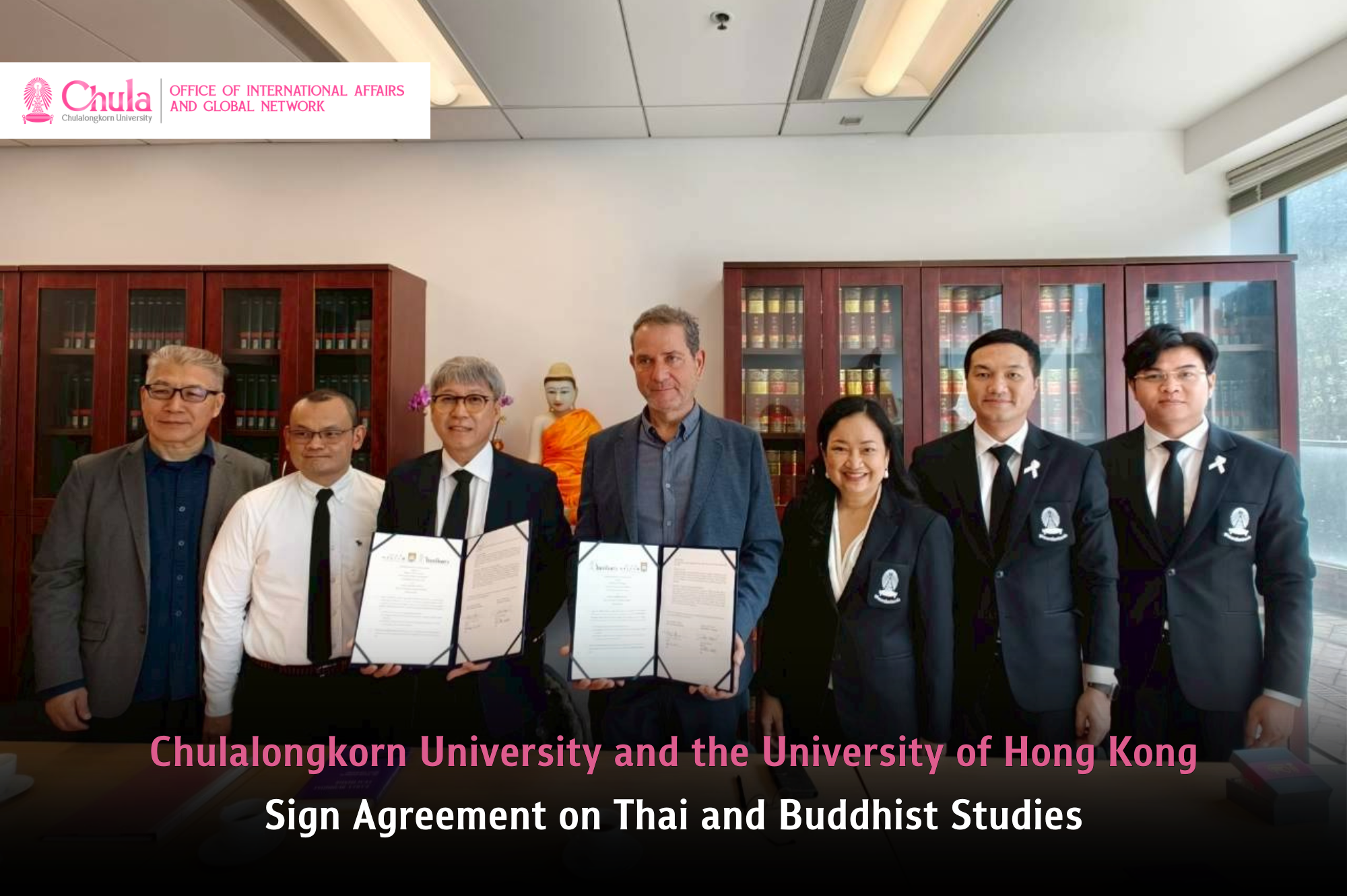Call for Expression of Interest for UN ESCAP-APRU-Google.org ‘AI For Social Good Project’

The APRU International Secretariat is calling for scholar participation to develop research that can help inform policies on AI for Social Good in particular country-specific contexts as part of a collaboration between United Nations ESCAP, APRU and Google.
Applications for participation should be sent to the APRU Secretariat by February 22, 2022.
Background:
The project title is “AI for Social Good: Strengthening Capabilities and Government Frameworks in Asia and the Pacific’. It aims to draw on expertise from research centers and universities in Asia and the Pacific to provide active research support in the development of country-specific AI governance frameworks and national capabilities, to empower transparent AI ecosystems, and to develop AI solutions that tackle socio-economic challenges.
Researchers with AI-related expertise from a range of disciplines – including, but not limited to, computer science, law, politics/political science, philosophy, international relations, sociology, statistics, public policy, and law – are very welcome to apply. Participants will respond to one research question/problem, which has been identified by a national government agency of Thailand. (As part of the application process, candidates are asked to specify how they would draw on their own area of expertise to respond to one of the questions.)
Project Overview:
– Particular AI-related research and analysis needs have been identified by the Thai Office of National Higher Education, Science Research and Innovation Policy. Applicants are asked to choose one research question/problem, under either ‘Medicine and Healthcare’ or ‘Poverty Alleviation’, to respond to in their policy research paper. (Representatives from the relevant government agencies will provide guidance to the researchers as they draft their papers.)
Up to two lead scholars will be selected for this call to:
- conduct research and develop a research paper responding to one of the identified AI-related research needs and a corresponding research question, with the aim of responding to the particular Thai context and informing policy.
- participate in up to two country workshops (the 1st workshop will help further define the country needs, the second workshop will discuss how research findings may be translated into policy action)
- attend a regional summit to disseminate findings and insights at the regional level.
The research will help to inform policies by addressing identified research and analysis gaps. Participants will share their findings with government agencies and their key stakeholders to support the development of policies promoting and enabling AI policy frameworks and building AI capabilities for social good.
AI-related Research and Analysis Needs:
1. Medicine and Healthcare
Rationale and problem statement:
AI is becoming ubiquitous and is expected to create unprecedented impacts on societies. In Thailand, research work on AI for medical applications has increased exponentially in the past few years. Some Thai companies have already invested in developing AI-based medical products and services and plan to release them to the market in the near future. However, the progress in developing and applying AI from research to market in the area of medicine and healthcare is quite slow due to no clear AI governance framework. In order to support and accelerate the use of AI in medicine and healthcare, analyses are needed to identify crucial bottlenecks and gaps. After that, an AI governance framework should be designed to cope with those challenges.
Research questions:
- What are the fundamental obstacles to accessing medicine and healthcare data in Thailand and how can these be mitigated?
- What are appropriate guidelines for ensuring responsibility and accountability in accessing medicine and healthcare data in Thailand?
- How can we best design guidelines for an AI innovation and development sandbox in Thailand in the context of medical products and services?
2. Poverty Alleviation
Rationale and problem statement:
To alleviate poverty and inequality in Thailand, the Thai government has developed data-driven decision-making systems to improve public access to state welfare programs. These systems include the Thai People Map and Analytics Platform that targets poverty alleviation (https://www.tpmap.in.th/) and the Thai Small and Medium Enterprise for Government Procurement System that supports SME in accessing government procurement programs (https://www.thaismegp.com/ ). However, due to the highly technical nature of these systems, they are used almost exclusively by local government offices that know how to interpret the data shown in the systems. Improving the human-centred design and public accessibility of these technologies will be crucial to increasing Thai citizens’ sense of ownership towards the use of their own data, thereby promoting general awareness in Thai society and government agencies of the importance of data sharing for poverty alleviation programs.
Research questions:
- What are the appropriate guidelines for government agencies and local governments in Thailand to ensure responsible and accountable data sharing in the context of poverty alleviation projects?
- How can we most effectively raise awareness in Thailand of the importance of data sharing and exchange for the benefit of socio-economically disadvantaged citizens (as data owners) in the context of poverty alleviation projects.
Funding:
The project is funded by Google.org, supported by United Nations ESCAP and organized by the APRU International Secretariat.
Total funding of US$ 10,000 is available to support the development of each policy research paper. This funding is to cover the participation costs, including flights, accommodation, and local transport to attend one country workshop and the final summit in Canberra, Australia.
Please note that while an individual academic or a team of academics can work on the development of a paper, the total grant amount awarded per paper will not increase with the number of academics contributing.
Expected Participant Contributions:
- Participation in two country workshops (1st workshop is expected to be held in virtual mode and the 2nd face-to-face, COVID restrictions allowing)
- Virtual participation in two project meetings (with lead and participating academics)
- Submission of a paper outline, followed by the 1st draft of the paper, and then the final version of the policy research paper
- Participation in a regional summit, (face-to-face COVID restrictions allowing) to take place in mid-2023 in Canberra, Australian (date tbc).
Key Dates and Timeline:
- Applications for participation to be sent to Tina.Lin@apru.org by February 22, 2022.
- Selected research teams will be notified by late March 2022
- The 1st country workshop to define country needs, April 2022 (exact date tbc)
- Submission of first outline of paper by late July 2022 (date tbc)
- Submission of 1st draft of paper by late Nov 2022 (date tbc)
- Submission of final paper by late March 2023 (date tbc)
- Participation in 2nd country workshop, May 2023 (date tbc)
- Participation in regional summit, to take place at the Australian National University in Canberra, Australia (COVID restrictions allowing), July 2023 (date tbc).
Eligibility:
Scholars employed at APRU member universities will be eligible to apply to participate in the project. Applicants from non-APRU universities are also welcome, based on recommendations from APRU, Google, or United Nations ESCAP.
How to Engage:
Please see the call document for specific project details, engagement areas, funding, expected contributions by the participants, the project timeline, and eligibility.
Scholars interested in participating and responding to this first round of research questions will need to email their completed expression of interest form (part of the call document) to Ms Tina Lin, tina.lin@apru.org by 22 February 2022.
For information about our current projects on AI please visit our website.
For any queries, please contact Christina Schönleber, Senior Director Policy & Research Programs at christina.schoenleber@apru.org.





